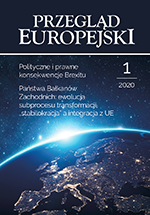Ekonomiczne aspekty integracji Bośni i Hercegowiny z Unią Europejską w drugiej dekadzie XXI wieku
Economic aspects of the integration of Bosnia and Herzegovina with the European Union in the second decade of the 21st century
Author(s): Monika SzynolSubject(s): Politics / Political Sciences, Political Sciences
Published by: Wydawnictwa Uniwersytetu Warszawskiego
Keywords: Bosnia and Herzegovina; Western Balkans; the European Union; the EU’s enlargement policy
Summary/Abstract: At the end of the second decade of the 21st century the European Union (EU) – presentinga new strategy of enlargement policy, organising an official summit of the state leaders anddevoting to potential accessions the meeting of the Council of the EU – recalled that the futureof the Western Balkans lies in the EU. Therefore, there is a reasonable question: whether theintensification of the EU’s enlargement policy will affect favourably Bosnia and Herzegovina,a state considered as a potential candidate for the membership since 2003? Basing on (interalia) official documents issued by the EU institutions, macroeconomic data and in relation tothe EU’s policy towards the Western Balkans region, it is worthwhile to suppose, that – despitenumerous (political, economic, social) deficits and weaknesses – Bosnia and Herzegovina, which applied for membership in the EU in 2016, will receive the status of an official candidatecountry soon (in the third decade of the 21st century).
Journal: Przegląd Europejski
- Issue Year: 2020
- Issue No: 1
- Page Range: 179-198
- Page Count: 20
- Language: Polish

